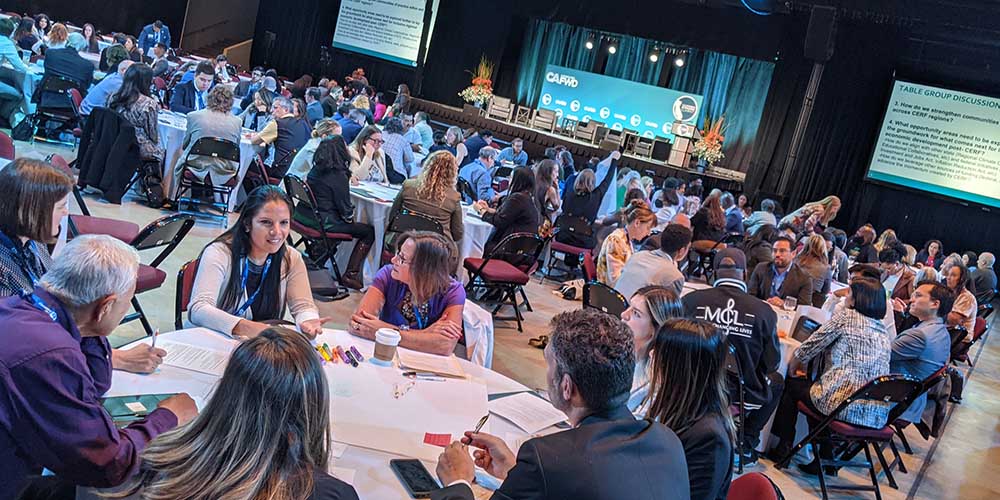
(Photo: John Guenther/CA FWD)
The California Economic Summit work groups meet throughout the year, but it’s during the annual California Economic Summit event that the policy is formed and refined. Participants attend the sessions led by state leaders and experts to discuss recommendations and work with each other to analyze those recommendations. The results from the work groups will be included in the next CA FWD Roadmap to Shared Prosperity.
Nine Work groups met during this year’s Summit:
Building a Sustainable Energy Future
This work group discussed the importance of Kern County’s role in California’s energy production and how the region is ready to reinvent itself as the state moves toward low-carbon energy solutions. Work group participants recommended that politics be taken out of the solution and the solution should rely on science.
You can read more about the urgent need for aligned statewide energy policy in CA FWD’s recent Energy Call to Action.
Broadband for All
The Broadband for All work group focused on equitable access to broadband is critical to ensuring the success and well-being of all Californians.
Key Recommendations:
- Advocate for the state’s historic investments, legislative actions and State Broadband Action Plan to be implemented swiftly, efficiently and effectively in tandem with new federal funding streams and
- Support the work of the Regional Broadband Consortia and other partners in advancing broadband solutions tailored to regions and communities.
Economic Prosperity in a Changing Climate
This work group focuses on how climate adaptation and mitigation can create pathways for new industries, technologies, jobs and economic mobility.
Key Recommendations:
- Embed climate and equity as fundamental elements of each decision we make about systems like land use, housing, transportation, career pathways, natural resource management and community investment,
- Integrate climate planning within CA FWD’s broader policy agenda, and
- Promote and raise awareness of collaboration across climate and economic development stakeholders and across state and federal economic and climate programs.
Advancing Inclusive Regional Economies (Going Beyond CERF)
California Leadership Council Co-Chair Ashley Swearengin reported the Advancing Inclusive Regional Economies work group is focusing on the three I’s – Integration on what’s going on at the local and regional level, Inclusion in the processes and leveraging Investments.
Education and Workforce
The Education and Workforce work group focuses on moving the needle on student and labor market outcomes.
“Focus on how critical childcare and early childhood education is, not only for our children who have just been through a pandemic and other, but for our workforce to have parents in it,” reported Catharine Baker, vice-chair of the California Forward Leadership Council. She also reported the work group discussed the need to incentivize employers to provide childcare, allowing parents to participate in the workforce.
Resilient and Productive Landscapes
Key Recommendations:
- Establish a factual, evidence-driven basis for ensuring that California builds on the state’s 2021 $1.5 billion investment for wildfire and forest resilience to reach the $3-5 billion that will be required annually to address the size and scale of the crisis and
- Broaden outreach and coalition-building across diverse communities, sectors and lands to address challenges including workforce development, infrastructure investments, biomass industry development, community capacity-building, regulatory streamlining, and protecting and enhancing natural resources and upper watersheds.
Entrepreneurship and Small Businesses Owned by People of Color
This work group discussed the three C’s of building Coaches who can support small businesses, access to Capital and supporting a Culture that values entrepreneurs.
“So many of our small businesses are holding up so many local economies and yet they are really struggling of how to pay their rent,” said Jacqueline Martinez Garcel, CEO of the Latino Community Foundation and member of the California Forward Leadership Council, regarding her work group report-out. “Inflation and lack of workers are serious challenges facing our small businesses. Who is stepping up to help them now?”
The Creative Economy
The Creative Economy work group, making its debut at the Summit, represents an important addition as the arts and culture economy is responsible for $225 billion in economic output and 7.5% of the California gross state product (GSP). Senator Ben Allen (D-Santa Monica) sponsored SB628, which was passed and signed by Gov. Newsom, explained why he supports the arts, saying “I meet so many people in the arts world and these are wonderful folks who drive so much of what makes California special and we chronically underinvest.”
Key Recommendations:
- Strengthen a creative workforce and industry grounded in equity,
- Prioritize the creative economy as a leading industry in California,
- Integrate arts and culture into local community and economic development strategies, and
- Develop policies to support creative small businesses and self-employed arts workers.
Housing and Homeownership
The Housing and Homeownership work group focuses on developing scalable and sustainable place-based solutions to generate wealth and increase ownership of homes by communities of color.
“Looking at it locally in Kern County, homelessness has increased by 20% in the last year,” said Martinez Garcel. “The idea is first tackling this problem from the abundance and not scarcity and that we have the (state) resources to house.”
On homeownership, she added, “We should be moving toward not just affordable housing and interim housing, but homeownership as a way of helping communities of color build wealth.” This effort includes the California Dream for All program included in the state budget and which is California’s largest homeownership program and which helps first-time homebuyers with down payment assistance.
The California Economic Summit continues Friday with panel discussions that center around regions-up solutions to create a just and sustainable state and the presentation of the California Regional Steward Leader to Los Angeles County Economic Development Corporation’s President and CEO Bill Allen, the Statewide Steward Leader Awards Kate Gordon, senior advisor to energy secretary Jennifer Granholm at U.S. Department of Energy (DOE) and the inaugural California Young Leader Award to Michael Wiafe, Government and Community Relations Fellow at the Inland Empire Community Foundation.

